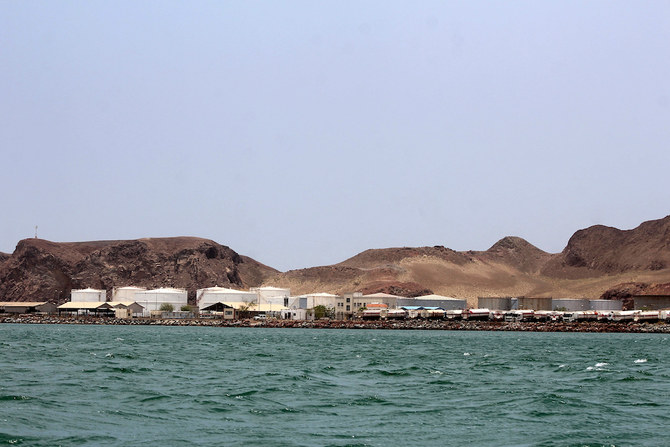LONDON: The UN on Saturday condemned an armed drone attack launched By Yemen’s Houthi militia on a southern oil terminal in Hadramout province a day earlier, saying it was a “deeply worrying” military escalation.
“I condemn the aerial attack claimed by Ansar Allah yesterday, Oct. 21, against the vessel at Al-Dhabba oil terminal in Hadramout governorate,” the UN’s envoy to Yemen said referring to the Houthis by their official name.
“At this critical juncture, I call on the parties to show utmost restraint and double their efforts to renew and expand the truce, lay the groundwork for a permanent cease-fire, and activate a political process to end the conflict,” said Hans Grundberg.
“I reiterate that all parties must abide by their obligations under international humanitarian law to protect civilians and civilian infrastructure,” he added in a statement.
Yemen’s internationally-recognized government said on Friday that drones launched by the Iran-backed Houthis attacked the Al-Dhabba oil terminal, located in the southern town of Al-Shihr, as the Nissos oil tanker was preparing to dock.
Grundberg held a phone call with Yemen’s Foreign Minister Ahmed Awad bin Mubarak on Friday to discuss the “catastrophic consequences of the Houthi attacks on oil ports,” the minister had said, adding that he stressed that the Houthis are only “reinforcing the conviction that they are merely a terrorist group, not a peace partner.” He also called for the UN to take a “strong stance against these terrorist acts.”
Bin Mubarak said he also held a call with the US ambassador to Yemen, Steven Fagin, to discuss the consequences of the attacks on civilian facilities and commercial ports, and how it would worsen the humanitarian crisis in Yemen, adding he “demanded strong measures to put an end to Houthi terrorism.”
Separately, Fagin said the US strongly condemned the incident and called on the Houthis to immediately halt such attacks, which hinder navigational rights and freedoms and jeopardize international commerce.
“We are glad that no lives were lost in the attack and that the ship was able to depart safely, but such attacks threaten Yemen’s peace and security, hinder the flow of essential goods, and will only trigger further economic instability and suffering across the country,” Fagin said in a statement.
“We remind the Houthis that the world is watching their actions and that the only path forward to ending eight years of destructive war is to deescalate and redouble efforts to reach a durable cease-fire and end Yemen’s conflict through a negotiated political settlement,” he said. “Only through an extension of the truce can we ensure payment of salaries, free movement on Yemen’s roads and through its ports and airports, and an end to the cycle of destructive violence that has plagued Yemen for eight years.”
The UK government said this is “a part of a pattern of Houthi attacks which hurt first and foremost the Yemeni people. Such attacks hinder the flow of trade which then directly increases the cost of key daily services and products for Yemenis. We urge the Houthis to stop harming the Yemeni people.”
The Delegation of the European Union to Yemen said: “Houthi attacks on international shipping are an affront to core principles of the law of the sea, jeopardizing freedom of navigation through the region’s waterways and blocking access to Yemeni ports. They deprive Yemenis the ability to afford fundamental necessities and could impact the flow of essential goods into Yemen.”
A UN-mediated truce in Yemen that had been in place since April, expired on Oct. 2 without the parties reaching an agreement, amid differences over payment of salaries for civil servants in Houthi-controlled areas, and the incident is the first major escalation since then.
During a separate call with Sweden’s envoy to Yemen Peter Semneby, the Yemeni foreign minister reiterated that the international community should take concrete measures to put an end to the Houthi-Iranian UAVs aggression.
The Arab League also condemned the attack and said that the present dangerous Houthi escalation represents a disregard and a defiance to the tireless international and regional efforts aimed at renewing the truce, adding that the militia’s targeting of oil ports will further deteriorate the humanitarian situation in Yemen, and would pollute the marine environment.
The Arab Parliament affirmed its full solidarity with the legitimate government in “whatever it takes to confront the coup militias,” asserting its rejection of the escalation by the Houthis and their determination to foil the peace efforts.
The Organization of Islamic Cooperation stressed that the attack represents a threat to regional and international energy supplies, is a violation of UN Security Council Resolution No. 2216 and international laws and norms, and a threat to global energy corridors and the marine environment.
Secretary-General Hussein Ibrahim Taha called on the Iran-backed group to respond to international and regional efforts to renew the truce, and to cooperate with all efforts to reach a political and comprehensive solution to the Yemeni crisis.
The Gulf Cooperation Council also warned of the threat the attack poses on civil and economic facilities and global energy supplies and installations, and called on the international community to assume its responsibilities to ensure such acts are not repeated, in order to preserve the movement of trade and oil supplies, and maintain security and stability in the region.
Secretary-General Nayef Al-Hajraf affirmed the GCC’s firm position toward supporting everything that guarantees the security and stability of Yemen, backing the endeavours of the legitimate Yemeni government, and the UN efforts to renew the truce in Yemen and to reach a comprehensive political solution to end the war.
Saudi Arabia, the UAE, Egypt, Kuwait, Bahrain and Jordan also issued similar statements condemning the attack, calling it a dangerous escalation, and calling on the international community to unite efforts and take a decisive stance to stop the crimes committed by the Houthis.






















